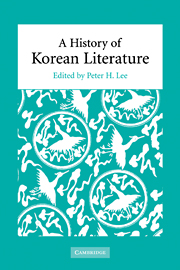Book contents
- Frontmatter
- Contents
- List of illustrations
- List of contributors
- Preface
- Note on the text
- Korean dynasties
- Glossary
- East Asia
- Principal places in works discussed
- Introduction
- 1 Language, forms, prosody, and themes
- 2 From oral to written literature
- 3 Hyangga
- 4 Silla writings in Chinese
- 5 Koryŏ songs
- 6 Koryŏ writings in Chinese
- 7 Early Chosŏn eulogies
- 8 Early Chosŏn sijo
- 9 Early Chosŏn kasa
- 10 Late Chosŏn sijo
- 11 Late Chosŏn kasa
- 12 Chosŏn poetry in Chinese
- 13 Chosŏn fiction in Chinese
- 14 Chosŏn fiction in Korean
- 15 P'ansori
- 16 Folk drama
- 17 Literary criticism
- 18 Early twentieth-century poetry
- 19 Early twentieth-century fiction by men
- 20 Early twentieth-century fiction by women
- 21 Late twentieth-century poetry by men
- 22 Late twentieth-century poetry by women
- 23 Late twentieth-century fiction by men
- 24 Late twentieth-century fiction by women
- 25 Literature of North Korea
- Bibliography
- Suggestions for further reading
- Index
15 - P'ansori
Published online by Cambridge University Press: 22 September 2009
- Frontmatter
- Contents
- List of illustrations
- List of contributors
- Preface
- Note on the text
- Korean dynasties
- Glossary
- East Asia
- Principal places in works discussed
- Introduction
- 1 Language, forms, prosody, and themes
- 2 From oral to written literature
- 3 Hyangga
- 4 Silla writings in Chinese
- 5 Koryŏ songs
- 6 Koryŏ writings in Chinese
- 7 Early Chosŏn eulogies
- 8 Early Chosŏn sijo
- 9 Early Chosŏn kasa
- 10 Late Chosŏn sijo
- 11 Late Chosŏn kasa
- 12 Chosŏn poetry in Chinese
- 13 Chosŏn fiction in Chinese
- 14 Chosŏn fiction in Korean
- 15 P'ansori
- 16 Folk drama
- 17 Literary criticism
- 18 Early twentieth-century poetry
- 19 Early twentieth-century fiction by men
- 20 Early twentieth-century fiction by women
- 21 Late twentieth-century poetry by men
- 22 Late twentieth-century poetry by women
- 23 Late twentieth-century fiction by men
- 24 Late twentieth-century fiction by women
- 25 Literature of North Korea
- Bibliography
- Suggestions for further reading
- Index
Summary
P'ansori is an oral narrative that has been cherished by Koreans ever since its inception in the seventeenth century. A highly sophisticated genre that demonstrates diverse Korean musical forms, it is at the same time a form of oral narrative that weaves together an array of characters and events using both verse and prose. Traditionally p'ansori was sung by performers known as kwangdae in rural villages or marketplaces. Sometimes the kwangdae were invited to perform at banquets hosted by the literati and wealthy patrons, too. Their talent was for hire.
P'ansori is deeply rooted in popular art. Unlike mask dance or folk songs, however, it possesses depth and versatility and embraces a much larger and more diverse audience. It includes the use of extreme comic expression, witticisms that make the audience burst into laughter, and the caricature of Confucian ideas and taboos. Furthermore, it uses tragic language that touches the soul and expresses the dark side of life. At the heart of p'ansori one finds the vivacious language of the common people combined with a simple grace.
P'ansori performance is remarkably simple. It requires only two performers: a singer (kwangdae) and a drummer (kosu). The singer stands on a straw mat and the drummer sits two or three meters in front of him facing the singer (or occasionally to the side). As the singer sings, the drummer beats the drum to accompany him. Apart from the singer and the drummer, no other special equipment or assistance is necessary.
- Type
- Chapter
- Information
- A History of Korean Literature , pp. 288 - 302Publisher: Cambridge University PressPrint publication year: 2003



